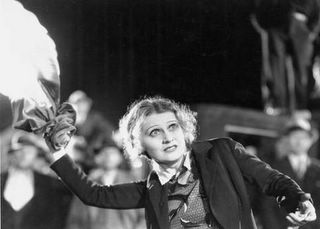Fury
This is the second review I've posted for movie out of Warner's recent Confidential Classics box set. The first was I Am a Fugitive From a Chain Gang, which you can read here, if you like. The two films have a good deal in common - they take contemporary social problems in the 1930's and turn them into tragic melodramas.
In Chain Gang, an out of work drifter played by Paul Muni finds himself railroaded by corrupt Southern lawmen into an oppressive chain gang. In Fritz Lang's 1936 film Fury, Spencer Tracy plays a man whose life is threatened by a lynch mob after he's mistakenly arrested for a kidnapping. The films share a grim outlook, though Fury unfolds with a bit more optimism, but Lang's film lacks the entertainment value, the pure pulp joy of Chain Gang. It's an ambitious film, and a well-meaning one, with some terrific black and white cinematography and another graceful, well-pitched turn by Tracy, but it's hampered by some awkward plotting and stumbles badly in the third act.
Like Muni's out of work protagonist in Chain Gang, Tracy's Joe Wilson is an unbelievably kind soul who faces constant and unceasing hardship out there in the cruel world. These are not escapist films that transported their Depression-era audiences to another time or place, where things are simpler. They left that to movies like Wizard of Oz. Fury is the kind of movie that takes a long, pained look at America's Heartland and leaves essentialy disgusted by what it has found.
Tracy must first convince his hoodlum brothers to leave the Mafia and start up their own business. He's trying to raise money to marry his long-time sweetheart, Katherine (Sylvia Sidney), and he needs their help. Once the cash has been earned, he buys a car and heads out to California for his nuptials. But he's sidelined along the way in a small town, where the sheriff arrests him on a kidnapping charge with highly dubious evidence. Soon enough, a bumbling deputy played by the inimitable Walter Brennan blabs to the townsfolk that a kidnapping suspect's being held in the town jail.
So, they do what anyone would do in that situation...and burn the jail down with Joe inside.
This happens at about the 40 minute mark, and it, obviously, atlers the course for the rest of the movie. Without giving too much away, I can tell you that Joe survives the fire (though he injures his arm somehow), but that he can't reveal to the world that he's alive. So the remainder of the film follows the murder trail for the 22 people indicted for participating in the lynch mob.
The movie never really recovers from the loss of Tracy. By sidelining the star (and the film's most charismatic, likable character), the film loses its focus, and even though the scenes featuring Walter Abel as a confident district attorney are well-composed, they aren't particularly captivating. Lang clearly has a lot to say about the nature of mob violence, and about the inherent alienation and loneliness that goes along with the quest for revenge, but his film is hamstrung by excessive lawyering and courtroom material.
So if some of the life of the movie seeps out during the second half, there's still plenty going on in Fury of note.
For one thing, there's a strong undercurrent of mysogeny here that I found interesting. In one sequence, a group of women are chatting and spreading mistruths about the kidnapping suspect, and Lang cuts briefly to a shot of clucking hens. As you can see in the image posted above, the initial blaze is set by a blonde woman with a maniacal look in her eye. And Joe's girlfriend Katherine exhibits little in the way of personality or bravery - she exists only to love Joe, to cook for him, and to faint whenever it appears he may be in trouble.
He hasn't told her he's still alive after the fire, and even though she gets clues in just about every other scene, it takes her the entire running time to catch on that Joey may not be dead. I mean, the fact that he may be alive is even being discussed in the trial she attends every day, and she never once doubts for a moment that he has expired. I mean...what gives?
I mentioned the cinematography above, but I'm going to bring it up one more time because it's so impressive. I love the extreme lighting effects in black and white films, which can't really be replicated in color. Fury is overloaded with wonderfully rich, expressive and foreboding shots, and the actual mob scene itself is a master class in editing. The action is paced perfectly, and when Joe's terrier Rainbow leaps through the bars to say goodbye to her master, it's really a tremendous moment.
So, some good and some bad. Fury is an engaging and iconic movie, that's for sure, and I like how you're never quite sure exactly where the story is going. But I can't say I found the experience altogether satisfying. I wanted more of an exploration of Joe's psychology. In the first half, he's this happy-go-lucky simpleton who wants nothing more than to marry his best girl and settle down. In the second half, he's become a twisted creep, hiding out from the world and obsessed with revenge. That transformation is given almost no screen time, so that we can get a bunch of speechifying. Um, great. Way to go, Fritz.
So, yeah, it's no M or Metropolis, but hey, what is?

No comments:
Post a Comment